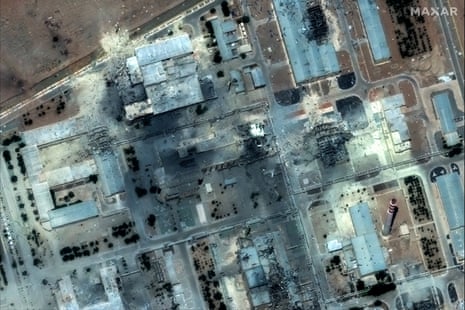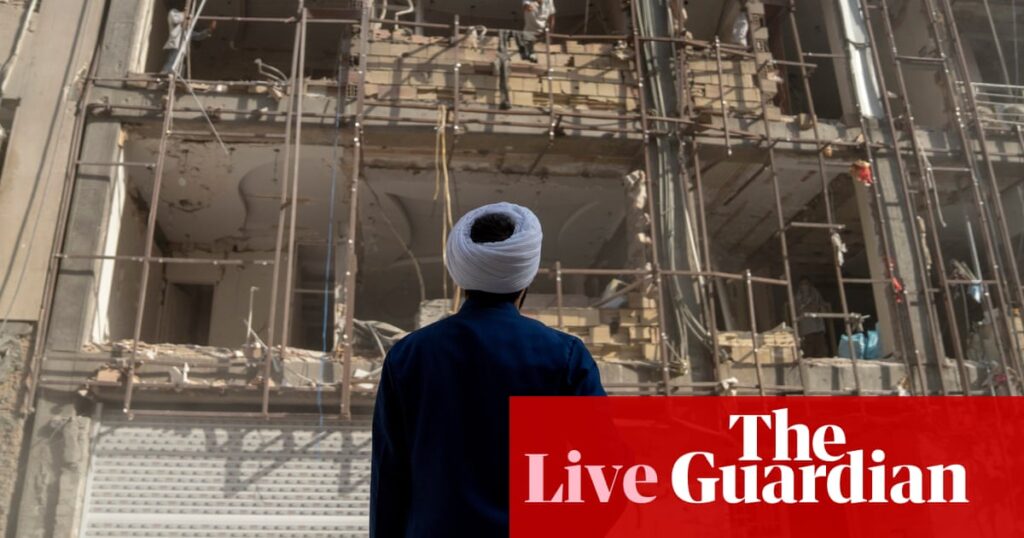Iran says it would resume nuclear talks with US if guaranteed no further attacks
Welcome to our live coverage of the Middle East, with a focus on the prospect of US-Iran nuclear talks restarting.
According to state media, Iran’s foreign minister, Abbas Araghchi, said on Saturday that his country would be willing to re-engage in nuclear talks with Washington if there were assurances of no more attacks against it.
Araghchi served as lead negotiator in the strained nuclear talks with the US over the summer, which collapsed after Israel launched a surprise attack on Iran’s nuclear sites on 13 June, including at the key Natanz nuclear site as well as at ballistic missile sites.
Referring to the subsequent 12-day Israeli bombardment of Iran’s nuclear and military sites, and the US airstrike on 22 June, Araghchi said that if the US and others wish to resume talks with Iran, then:
First of all, there should be a firm guarantee that such actions will not be repeated. The attack on Iran’s nuclear facilities has made it more difficult and complicated to achieve a solution based on negotiations.
Both Iran and the US struck Iranian nuclear facilities in June but did not destroy the Iranian nuclear programme, likely setting it back by a couple of months, according to an early Pentagon intelligence assessment of the attack.
The Trump administration, which claims that Iranian nuclear facilities were completely destroyed in the attacks, insists that Iran cannot be allowed to have a nuclear weapon.
Following the airstrikes, Iran suspended cooperation with the UN nuclear watchdog, the International Atomic Energy Agency (IAEA), which led to the departure of inspectors.

Iran says it is not developing nuclear weapons and that its enrichment of uranium is for peaceful purposes.
Iran is maintaining a fragile ceasefire with the US and Israel but the risk exists of the crisis flaring up into further warfare unless a diplomatic agreement is found soon.
We’ll continue to bring you the latest developments and analysis throughout the day, stay with us.
Key events
The Iranian foreign minister’s comments about the possibility of restarting nuclear talks follow Donald Trump’s Monday meeting with his Israeli counterpart, Benjamin Netanyahu, where he reportedly said he was open to lifting sanctions on Iran.
Earlier this month, the US issued a new wave of sanctions against Iranian oil exports. “I would love to be able to, at the right time, take those sanctions off,” Trump told a journalist at the White House on Monday night.
During the meeting with Netanyahu, Trump also said he “hoped” that the US would not strike Iran again.
“They want to work something out,” he said. “They’re very different now than they were two weeks ago.”
Iran says it would resume nuclear talks with US if guaranteed no further attacks
Welcome to our live coverage of the Middle East, with a focus on the prospect of US-Iran nuclear talks restarting.
According to state media, Iran’s foreign minister, Abbas Araghchi, said on Saturday that his country would be willing to re-engage in nuclear talks with Washington if there were assurances of no more attacks against it.
Araghchi served as lead negotiator in the strained nuclear talks with the US over the summer, which collapsed after Israel launched a surprise attack on Iran’s nuclear sites on 13 June, including at the key Natanz nuclear site as well as at ballistic missile sites.
Referring to the subsequent 12-day Israeli bombardment of Iran’s nuclear and military sites, and the US airstrike on 22 June, Araghchi said that if the US and others wish to resume talks with Iran, then:
First of all, there should be a firm guarantee that such actions will not be repeated. The attack on Iran’s nuclear facilities has made it more difficult and complicated to achieve a solution based on negotiations.
Both Iran and the US struck Iranian nuclear facilities in June but did not destroy the Iranian nuclear programme, likely setting it back by a couple of months, according to an early Pentagon intelligence assessment of the attack.
The Trump administration, which claims that Iranian nuclear facilities were completely destroyed in the attacks, insists that Iran cannot be allowed to have a nuclear weapon.
Following the airstrikes, Iran suspended cooperation with the UN nuclear watchdog, the International Atomic Energy Agency (IAEA), which led to the departure of inspectors.
Iran says it is not developing nuclear weapons and that its enrichment of uranium is for peaceful purposes.
Iran is maintaining a fragile ceasefire with the US and Israel but the risk exists of the crisis flaring up into further warfare unless a diplomatic agreement is found soon.
We’ll continue to bring you the latest developments and analysis throughout the day, stay with us.


